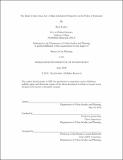The Dutch Urban Areas Act : a black liberation perspective on the policy of exclusion
Author(s)
Jordan, Reed (Reed K.)
DownloadFull printable version (3.138Mb)
Other Contributors
Massachusetts Institute of Technology. Department of Urban Studies and Planning.
Advisor
Justin Steil.
Terms of use
Metadata
Show full item recordAbstract
The Dutch Urban Areas Special Measures Act is a national policy in the Netherlands intended to improve the quality of life in distressed neighborhoods. The Act allows a municipality to designate neighborhoods where the municipality can alter the demographic composition through a housing permit system that regulates access to homes. Cities are allowed to deny permits for residence and therefore exclude in-moving people who do not have an income from work or who have certain police records. What began as a policy experiment in the City of Rotterdam animated by a far-right anti-immigrant movement, the Act is now an institutionalized policy accessible to any city in the Netherlands. In this thesis I present two key missing perspectives on the Dutch Urban Areas Act: how other Dutch cities are using the Act after its origins in Rotterdam and how to understand the Act through analytical frameworks around race. With these perspectives on the Dutch Urban Area Act I present two distinct arguments. The first is that the Dutch Urban Areas Act's diffusion to cities outside of Rotterdam is in conflict with its own statuary basis. Through a complete reassessment of the Acts social and political origins in Rotterdam, my second core argument is that the Dutch Urban Areas Act was conceived to be a spatial policy of racial exclusion. The foundations of the Urban Areas Act, as developed in Rotterdam in the early 2000s, are the same ideas of controlling the movement of a racialized group of people as expressed by state sanctioned segregation policies found historically in the United States and South Africa.
Description
Thesis: M.C.P., Massachusetts Institute of Technology, Department of Urban Studies and Planning, 2018. This electronic version was submitted by the student author. The certified thesis is available in the Institute Archives and Special Collections. Cataloged from student-submitted PDF version of thesis. Includes bibliographical references (pages 90-93).
Date issued
2018Department
Massachusetts Institute of Technology. Department of Urban Studies and PlanningPublisher
Massachusetts Institute of Technology
Keywords
Urban Studies and Planning.